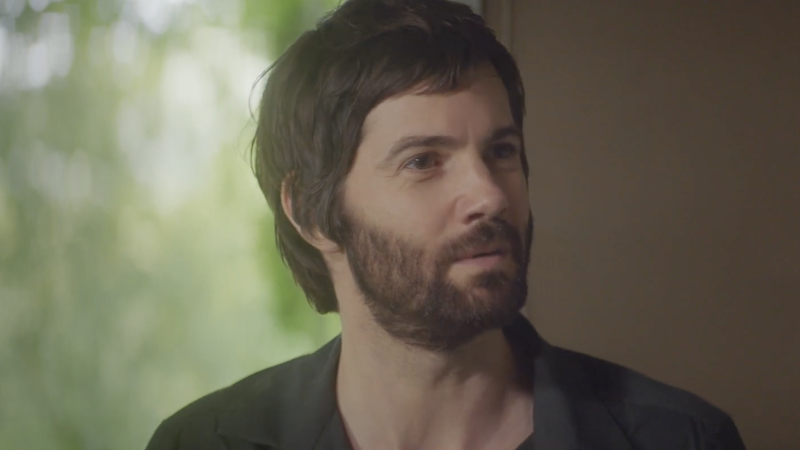MOVIE REVIEW: “The Other Me”
The dreamlike aura that surrounds the new film “The Other Me” is no surprise, considering the work is executive-produced by David Lynch and directed by a filmmaker whose previous short films have mostly been crafted with a sense of the unusual.
Director Giga Agladze does indeed have a working relationship with the surreal filmmaker, as the two co-founded the David Lynch Foundation Caucasus (DLFC) a branch of the director’s international organization, a cinema institute for projects between Georgia (Agladze was born in Tbilisi, at the intersection of Eastern Europe and Western Asia) and Hollywood.
Written and directed by Agladze, “The Other Me” (the director’s feature-length debut) stars a very good Jim Sturgess stars as Irakli, a man who finds that he is going blind, an affliction that exists in both the literal and metaphorical sense.
Irakli finds himself at a crossroads. He is a bartender on his way to being an architect and is constantly putting emotional distance between himself and his wife (Antonia Campbell-Hughes). He is the one pushing her away while complaining that she is never there for him. Their marriage is already unstable to begin with.
After falling asleep on a bus, Irakli finds himself in the country where he meets a stranger (Andreja Pejic). Their conversation leads to a strangely erotic moment that does not go far. Meeting this woman will change his life and affect those in his orbit in chaotic and emotionally straining ways.
The loss of sight begins coming in episodes, as do strange Lynchian hallucinations.
Stylistic comparisons to David Lynch cannot be ignored, as the master filmmaker certainly had an influence on director Algadze. As Irakli’s passion comes alive, the sexual and the surreal begin to blend together and a certain dream logic pulses throughout.
As paintings move and breathe and bizarre sightings of people in masks ensue, these moments are crafted with a tone that would be at home in the films of either Lynch, Kubrick, or Buñuel.
These scenes give the film its unique quality and cinematographer Konstantin Esadze creates some striking imagery; the most stunning being the sequence of characters carrying the weight of their suffering. It is a masterful moment whose roots are pulled from the German Expressionist era of filmmaking and perhaps a bit of Bergman.
As Irakli struggles with his diminishing sight and his growing attraction for this mystery woman, his best friend (Michael Socha) and wife spend their time helping him through his issues and deflecting his ever-growing argumentative personality. Irakli “cannot see” how he is hurting and driving away those who love him after already putting them at such a distance. His emotional blinders have also shaded him from the fact that his wife and best pal are having an affair. As we come to learn, their union was born of Irakli’s seemingly split personality and the two came together in desperation and emotional need.
It is here where the film’s themes regarding Irakli’s self-identification become clearer, even when the screenplay loses its way from time to time.
As Irakli becomes more obsessed with his mystery woman, his sightlessness increases, as do the hallucinations. The film shows flashbacks to his childhood, and we see how the identity issues began long ago at the hands of his abusive father. The moments are handled well, although their existence is unnecessary.
This is a film that addresses identity; self-identification, to be precise.
When he is with the mystery woman whom he cannot see, Irakli is at peace. His mind is mostly calm. Can it be that the two souls are connected through their childhood traumas? In his memories, our protagonist sees himself (as a boy) with his father, but there are visions of the mystery woman visiting the father as well. Reality is blurred and identities become somewhat clearer to Irakli.
Jim Sturgess is appreciable in the lead role, his is an interesting performance that expresses despair and rage fully in the face of losing one’s sight (self). If a few scenes lose their way, Sturgess nevertheless keeps his character balanced.
The actor pivots to comfort and a peaceful demeanor when in the presence of Pejic, whose performance adds to Sturgess’s work. The actress radiates warmth and understanding. The woman can see into Irakli’s soul deeper than he could imagine. Andreja Pejic performs the role with a luminous naturality, as if she walked out of a film noir. It is a great performance, and it is gratifying when a trans actress lands a major role.
While the structure can sometimes feel a bit awkward (an issue when a film has more than one editor) and the metaphors become a tad overused, “The Other Me” is a film rich with cues in the search for honesty and truth of the soul.
For patient viewers, this is a rewarding character piece that has something real to say as its layers are slowly revealed.
As the mystery woman says, “soon, everything will be revealed.”
news via inbox
Nulla turp dis cursus. Integer liberos euismod pretium faucibua



